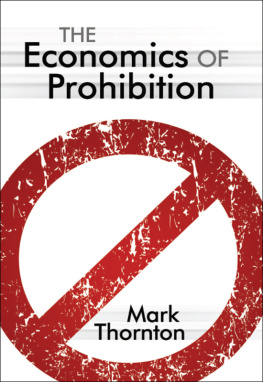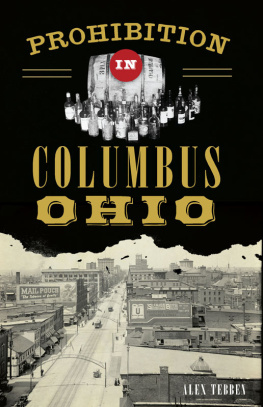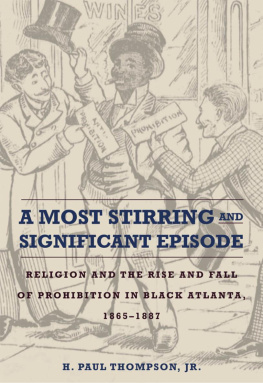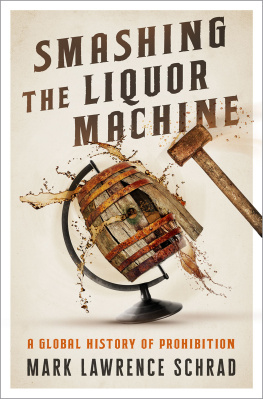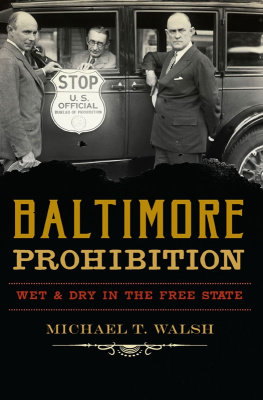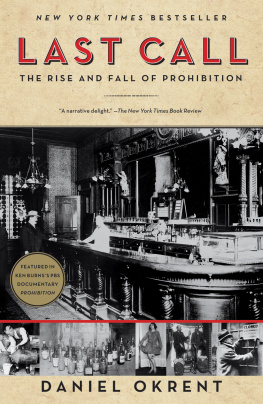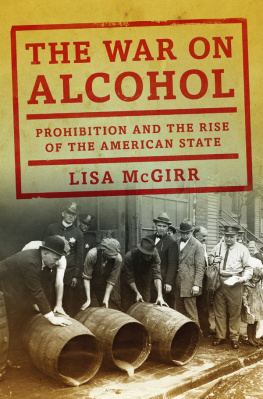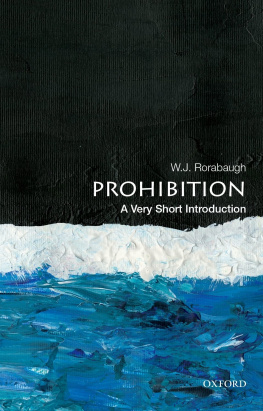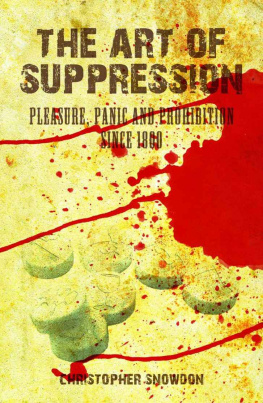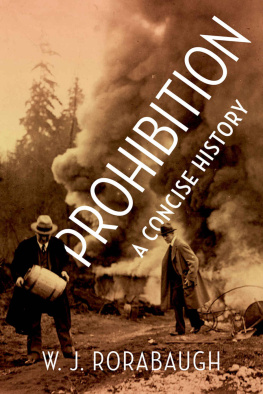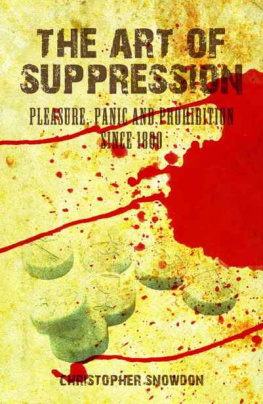The Economics of Prohibition
The Economics
of Prohibition
Mark Thornton
University of Utah Press
Salt Lake City

Copyright 1991 University of Utah Press
All rights reserved
The paper in this book meets the standards for permanence and durability established by the Committee on Production Guidelines for Book Longevity of the Council on Library Resources
Library of Congress Cataloging-in-Publication Data
Thornton, Mark.
The economics of prohibition / Mark Thornton.
p. cm.
Includes bibliographical references and index.
ISBN 087480-3756 (alk. paper).ISBN 087480-3799 (pbk. : alk. paper)
1. ProhibitionEconomic aspects. 2. ProhibitionEconomic aspectsUnited States. 3. Narcotics, Control ofEconomic aspectsUnited States. 4. Drug trafficEconomic aspectsUnited States. 5. Narcotics and crimeEconomic aspectsUnited States. I. Title. HV5088.T48 1991
| 338.43363410973dc20 | 9150333
CIP |
Contents
Figures
Tables
Foreword
F oreign wars come and go, but the Drug War is a constant of U.S. domestic policy. For nearly eight decades the government has attempted to prevent American citizens from using one or more illicit substances. By the 1980s the governments efforts had become truly draconian: more than one million drug arrests annually; minimum drug sentences that exceed the average punishment for murderers and rapists; increasing numbers of wiretaps; property confiscations and home evictions based on mere suspicion of drug use; ever more warrantless searches as part of the constantly expanding drug exception to the Fourth Amendment; growing involvement of the Central Intelligence Agency, Department of Defense, and National Guard; citywide curfews; and proposals for everything from shooting down unidentified planes at the border to declaring martial law.
Yet these efforts have yielded few positive results. The U.S. now has more than one million people in prison, yielding the highest rate of imprisonment in the industrial world. Young blacks are more likely to die in gun battles in the criminal underground, funded by drug prohibition, than they were while serving in the army in Vietnam. Drug users seeking to pay the inflated prices of illegal substances commit thousands of property crimes in cities and their suburbs. Children, who receive lesser criminal punishments, are increasingly recruited into the drug trade, where many become users.
Moreover, the law appears to have stopped few people from trying illicit substances. According to the National Institute on Drug Abuse, 74.4 million people over the age of 12 have tried drugs, despite decades of drug prohibition. Nearly 27 million use illegal substances at least once a year. Rates of drug use are now falling, but the declines started before the periodic escalations of the drug war during the 1980s.
Given this record, it is time to fundamentally reevaluate Americas drug policy. To do so risks attack from publicity-minded drug czars and vote-seeking politicians. But not to do so acquiesces to a policy that is needlessly imprisoning, maiming, and killing tens of thousands of people for voluntarily using and selling substances that are demonstrably less harmfulparticularly in the number of deaths they causethan the legal drugs alcohol and tobacco, the latter of which is subsidized by the federal government.
Courageously picking up the gauntlet tossed down by the drug war lobby is Mark Thornton. In a debate more often marked by emotion than facts, Professor Thornton looks at how illegal drug markets, for alcohol as well as todays disfavored substances, really work. Particularly important is his conclusion that such problems as crime and corruption are natural outgrowths of drug prohibition, not drug use. As a result, the deaths of innocent bystanders in drug dealers gun battles, for example, create an argument for drug legalization, not stricter enforcement.
Many readers may nevertheless disagree with Professor Thorntons conclusions. But they will still have an obligation to respond to his evidence that the costs of prohibition are huge and obvious, while the benefits are few and dubious. The burden of proving Professor Thornton wrong, and thereby justifying continuation of the drug war, now rests on those who oppose drug legalization.
| Cato Institute | DOUG BANDOW |
Acknowledgments
D uring my study of prohibition I have been helped by many friends and colleagues. Their encouragement, suggestions, and corrections made this book possible.
My gratitude and respect go to John D. Jackson, who provided the critical guidance so crucial to the completion of this project. The unceasing stream of comments and suggestions from Richard D. Ault and Leland B. Yeager contributed both insights and a broad perspective. Seth A. Anderson provided valuable suggestions and encouraged me in my efforts to find a publisher.
It is to the credit of my teacher, coauthor, colleague, and friend Robert B. Ekelund, Jr., that the lessons and debates in his classroom turned my question into an answeran answer that forms the foundation of this book.
I owe a special debt to the University of Utah Press, whose staff had the courage and foresight to bring this book to fruition. I am also grateful to the distinguished group of reviewers assembled for this projectBruce Benson, Charles Maurice, and Murray Rothbardeach of whom provided valuable comments and corrections.
Three institutions have provided support for this project. The Institute for Humane Studies at George Mason University provided my initial exposure to classical liberalism and academic research. I wish to offer my thanks for the 1990 F. Leroy Hill Summer Faculty Fellowship, and I give special thanks to Sheldon Richman for his assistance in preparing this manscript for publication.
I also wish to acknowledge the H. B. Earhart Foundation for its financial assistance during the preparation of this book.
My very special thanks go to the members and staff of the Ludwig von Mises Institute. The intellectual environment, continuous encouragement, and financial support they provided were invaluable. For their assistance and faith in me, I would especially like to thank Llewellyn H. Rockwell and O. P. Alford III.
It is my hope that the publication of this book begins to repay all those who have shown so much confidence in me.
Introduction
P rohibition has an ever-increasing impact on our daily life. In the United States, prohibition against certain drugs, involving wars on them, has become one of our most visible and hotly debated national problems. The purpose of the following investigation is to improve our understanding of the origins and results of prohibition, and therefore indirectly to contribute to future policymaking, shifting it toward rationality.
At the core of this book, one of the first theoretical investigations of prohibition, is an economic theory of prohibition, which defines prohibition as a government decree against the exchange of a good or service. Recent studies of decrees against cocaine, heroin, and marijuana suggest that these prohibitions impose heavy costs and are extremely difficult to enforce. Beyond such costs and enforcement difficulties, however, I argue that effective prohibition is impossible to achieve, because the unintended consequences of prohibition itself preclude any benefits.

